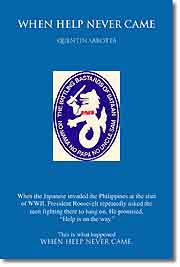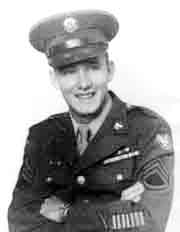|
From the publisher web site: www trafford.com Sample
Excerpt
Publisher Link
 About
the Book About
the Book
One man's story about how growing up on the farm prepared him
for Battan, Corregido, Cabanatuan, a Hell Ship, the POW camp
at Hirohata, Japan, and the life-long effects of being expendable
in the eyes of President Roosevelt.
About the Author
 Quentin R. Sabotta was born in
Trempeleau County, Wisconsin, on January 4, 1920. In 1940 he
joined the Army Air Corps when he ran out of money for college
tuition and soon found himself in the Philippines. For 3-1/2
years he was a prisoner of the Japanese, both in the Philippines
and Japan. After liberation, hospitalization and recovery, and
discharge from the Army, he graduated from Winona State College
serving as Senior Class President in 1948. He then graduated
from the University of Minnesota with a MA degree in Educational
Psychology. His professional career included 25 years with the
Cedar Rapids, Iowa, Community School District and 35 years with
Vocational Rehabilitation. Quentin R. Sabotta was born in
Trempeleau County, Wisconsin, on January 4, 1920. In 1940 he
joined the Army Air Corps when he ran out of money for college
tuition and soon found himself in the Philippines. For 3-1/2
years he was a prisoner of the Japanese, both in the Philippines
and Japan. After liberation, hospitalization and recovery, and
discharge from the Army, he graduated from Winona State College
serving as Senior Class President in 1948. He then graduated
from the University of Minnesota with a MA degree in Educational
Psychology. His professional career included 25 years with the
Cedar Rapids, Iowa, Community School District and 35 years with
Vocational Rehabilitation.
Sample Excerpt
Chapter VI - Mariveles
After our involvement in the Battle of Aglahoma Bay, our unit
was assigned to beach defense along the Mariveles peninsula.
This was a somewhat mountainous terrain with a few rather short
spikes jutting out into the sea. We proceeded to establish gun
emplacements on these in a general effort to discourage the Japs
from trying to make any sneak attack along this coast. I was
one of three men assigned to a gun position that was on the peak
closest to Corregidor and we were manning it twenty-four hours
a day.
On the night that Bataan fell it was my turn to stand the watch.
It was clear and calm that night and as I looked out toward the
sea it was picture of serene tranquillity. However there was
tension in the air that was grimly foreboding. We had received
word the day before that the Japs were waging a massive assault
on our front lines and it was feared that our defenses could
not repel the attack. The word came through about midnight that
the Japs had been able to penetrate on two points and it was
felt that they would soon be overrunning the entire peninsula
of Bataan. There was a phone at our position and I decided to
eavesdrop and get the latest word. I heard the orders coming
down from headquarters to unit commanders that they were to destroy
all arms, ammunition and gasoline, etc. and have the men gather
at the Mariveles air strip. While this word had been deemed inevitable
for some time, it was shocking to realize that it was finally
happening. As I listened further on the phone lines it was disturbing
to me to hear officers talking to each other and saying farewell
with such foreboding statements as "Don't know where we'll
meet again." What really shook me up however was hearing
my own commanding officer making a mutual pact with his best
friend, "If I don't make it back, please go tell my wife...."
This brought home to me the fact that our struggles were not
really over and that perhaps the greatest battle of all lay ahead.
By daybreak we had followed orders and destroyed all weapons
and were gathering at the Mariveles airstrip. My two buddies
from the gun position and I agreed that we would try to stick
together. At the airstrip several thousand men appeared to be
coming out of the hills from all directions. All were milling
around waiting for further word. There appeared to be some Japs
coming down the road although we had not made any direct contact
yet. Then about ten o'clock in the morning a flight of three
Jap bombers appeared and proceeded to bomb and strafe us in this
most vulnerable position. This really created havoc and everyone
seemed to scatter toward the outskirts to avoid the gunfire.
In the confusion that followed my buddies and I decided that
we would try to slip away and hid in a cave along the coastline.
We were familiar with the area and thought we might be able to
hide until dark and then try to head back to Corregidor. We also
knew where there was fishing banca (a 15 foot dugout canoe with
an outrigger) anchored and we commandeered it for our efforts.
We were only a few hundred feet from the airstrip we were very
worried that our presence would be detected.
As darkness began to fall we floated our banca and headed for
Corregidor. Because Corregidor was only seven miles away at that
point our plan seemed to us to be quite reasonable. Unfortunately
we were not sailors and obviously uninformed of the ways of the
sea. What we didn't realize was that this seven mile strip of
water was actually a channel connecting Manila Bay to the sea
and that at this time of day the tide would be going out. We
paddled vigorously for a couple hours and kept our eyes glued
on the target but began to realize that we were actually further
from Corregidor than we were at the beginning. It became obvious
then that we needed to change our course somewhat and get away
from these tide waters. After an hour or so the tides slackened
and we could again make our course directly toward Corregidor.
Our diet for the past two months had been cut to something like
half-rations and hunger was taking its toll. We had long passed
the point of exhaustion but the realization that we were now
making progress toward our objective inspired us to keep struggling.
When we finally hit the beach some Marines who were stationed
nearby came to help us. But I was so completely spent that I
simply fell on the sand and laid there for what seemed an eternity.
In all of my experiences I know that I have never been closer
to death than I was that night.
The next day we were taken to Marine Corps headquarters where
we became officially attached to the 4th Marines. We were then
assigned to a gun position on topside where the objective was
once again to prevent any Japanese infiltration. While up to
this time Corregidor had already survived an incredible number
of bomb raids, but now a new dimension was being added. The fall
of Bataan had enabled the Japanese to set up their artillery
positions on the mountainside that gave them a very marked advantage.
Unfortunately the mighty guns of Corregidor were placed so as
to protect from assault behind could not be pointed toward Bataan.
We were at the mercy of the Japanese artillery.
Adding to my personal woes was the fact that I began to realize
that I had contracted amoebic dysentery somewhere on my travels
to Marivelos and I was now becoming very ill. My memory of details
at this point is very vague but I do recall being carried on
a stretcher into the hospital section at Malinta tunnel. From
my hospital bed I was able to watch General Wainwright leave
the tunnel to make the formal surrender of the American forces
in the Philippines.
These were times of anxiety and despair for everyone around.
The nurses who cared for patients in the hospital and tried to
build up their morale were suffering and facing the same fears.
A nurse who had been caring for me had told me that she was engaged
and had planned to be married at Christmas in Minneapolis. But
now there was a great deal of uncertainty as to what everyone's
fate would be. Japan's refusal to accept and abide by the rules
developed at the Geneva Conference was very unnerving. There
certainly was a lot of bitterness over the fact the help that
we had been promised never came.
Catalogue Information
National Library of Canada Cataloguing
in Publication Data
Sabotta, Quentin R., 1920-
When help never came
ISBN 1-55212-740-0
1. Sabotta, Quentin R., 1920- 2. World War, 1939-1945--Prisoners
and prisons, Japanese. 3. World War, 1939-1945--Personal
narratives, American. 4. Prisoners of war--United States--Biography.
5. Prisoners of war--Japan--Biography. 6. Prisoners of
war--Philippines--Biography. I. Title.
D805.J3S22 2001 940.54'7252'092 C2001-910665-3
|
 About
the Book
About
the Book Quentin R. Sabotta was born in
Trempeleau County, Wisconsin, on January 4, 1920. In 1940 he
joined the Army Air Corps when he ran out of money for college
tuition and soon found himself in the Philippines. For 3-1/2
years he was a prisoner of the Japanese, both in the Philippines
and Japan. After liberation, hospitalization and recovery, and
discharge from the Army, he graduated from Winona State College
serving as Senior Class President in 1948. He then graduated
from the University of Minnesota with a MA degree in Educational
Psychology. His professional career included 25 years with the
Cedar Rapids, Iowa, Community School District and 35 years with
Vocational Rehabilitation.
Quentin R. Sabotta was born in
Trempeleau County, Wisconsin, on January 4, 1920. In 1940 he
joined the Army Air Corps when he ran out of money for college
tuition and soon found himself in the Philippines. For 3-1/2
years he was a prisoner of the Japanese, both in the Philippines
and Japan. After liberation, hospitalization and recovery, and
discharge from the Army, he graduated from Winona State College
serving as Senior Class President in 1948. He then graduated
from the University of Minnesota with a MA degree in Educational
Psychology. His professional career included 25 years with the
Cedar Rapids, Iowa, Community School District and 35 years with
Vocational Rehabilitation.